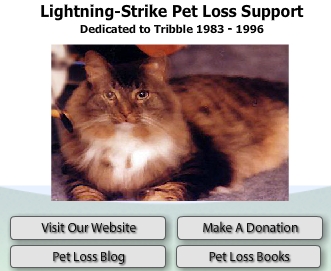The death of a cherished pet creates a sense of loss for adults and produces
a predictable chain of emotions. The stages of grief are typically denial,
sadness, depression, guilt, anger, and, finally, relief (or recovery). However,
the effects on children vary widely depending upon the child's age and maturity
level. The basis for their reaction is their ability to understand death.
Two and Three Year Olds
Children who are two or three years old typically have no understanding of
death. They often consider it a form of sleep. They should be told that their
pet has died and will not return. Common reactions to this include temporary
loss of speech and generalized distress. The two or three year old should be
reassured that the pet's failure to return is unrelated to anything the child
may have said or done. Typically, a child in this age range will readily accept
another pet in place of the dead one.
Four, Five, and Six Year Olds
Children in this age range have some understanding of death but in a way that
relates to a continued existence. The pet may be considered to be living
underground while continuing to eat, breathe, and play. Alternatively, it may be
considered asleep. A return to life may be expected if the child views death as
temporary. These children often feel that any anger they had for the pet may be
responsible for its death. This view should be refuted because they may also
translate this belief to the death of family members in the past. Some children
also see death as contagious and begin to fear that their own death (or that of
others) is imminent. They should be reassured that their death is not likely.
Manifestations of grief often take the form of disturbances in bladder and bowel
control, eating, and sleeping. This is best managed by parent-child discussions
that allow the child to express feelings and concerns. Several brief discussions
are generally more productive than one or two prolonged sessions.
Seven, Eight, and Nine Year Olds
The irreversibility of death becomes real to these children. They usually do
not personalize death, thinking it cannot happen to themselves. However, some
children may develop concerns about death of their parents. They may become very
curious about death and its implications. Parents should be ready to respond
frankly and honestly to questions that may arise. Several manifestations of
grief may occur in these children, including the development of school problems,
learning problems, antisocial behavior, hypochondriacal concerns, or aggression.
Additionally, withdrawal, over attentiveness, or clinging behavior may be seen.
Based on grief reactions to loss of parents or siblings, it is likely that the
symptoms may not occur immediately but several weeks or months later.
Ten and Eleven Year Olds
Children in this age range generally understand death as natural, inevitable,
and universal. Consequently, these children often react to death in a manner
very similar to adults.
Adolescents
Although this age group also reacts similarly to adults, many adolescents may
exhibit various forms of denial. This usually takes the form of a lack of
emotional display. Consequently, these young people may be experiencing sincere
grief without any outward manifestations.


 Jul 10 2003, 04:04 PM
Jul 10 2003, 04:04 PM



 �JOIN OUR FACEBOOK FAN PAGE >>
�JOIN OUR FACEBOOK FAN PAGE >>




